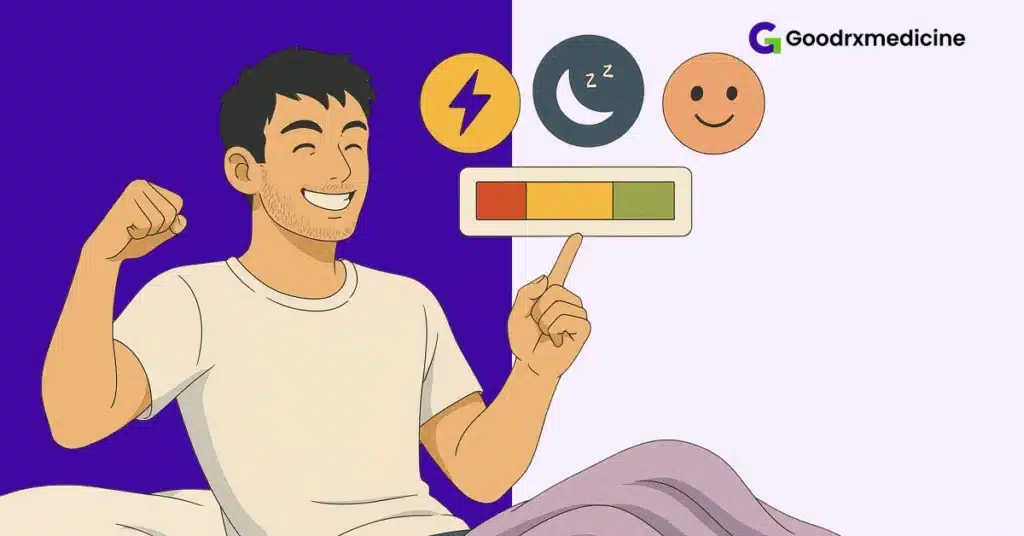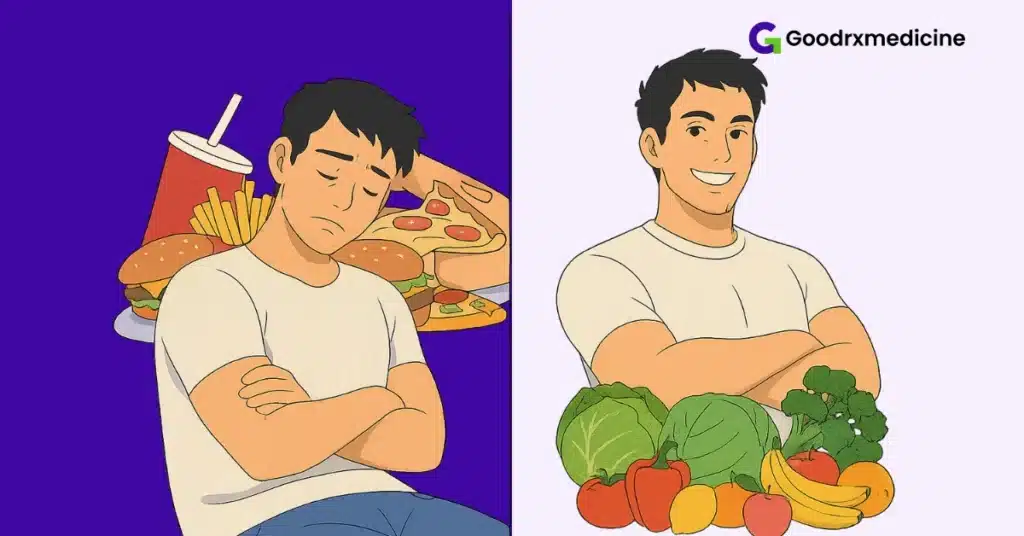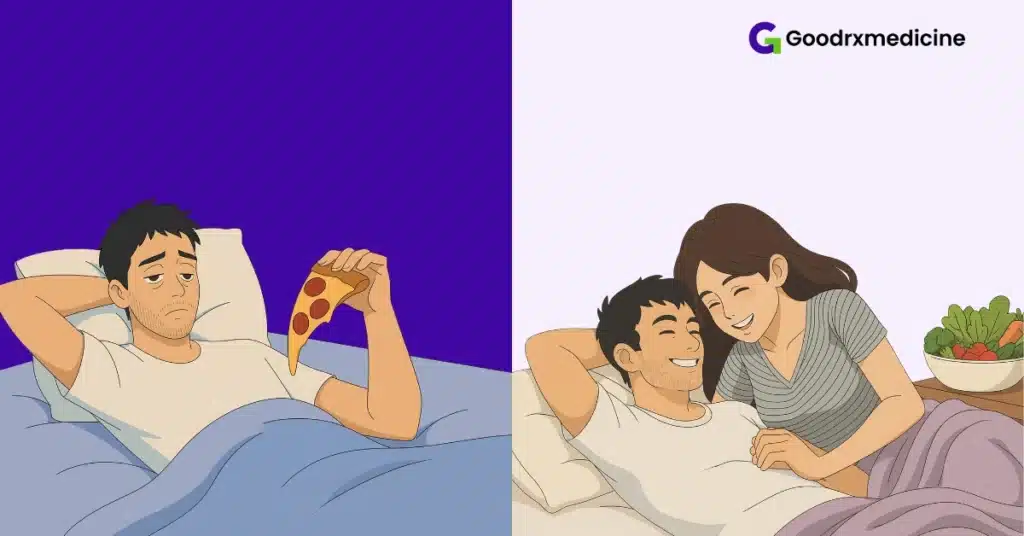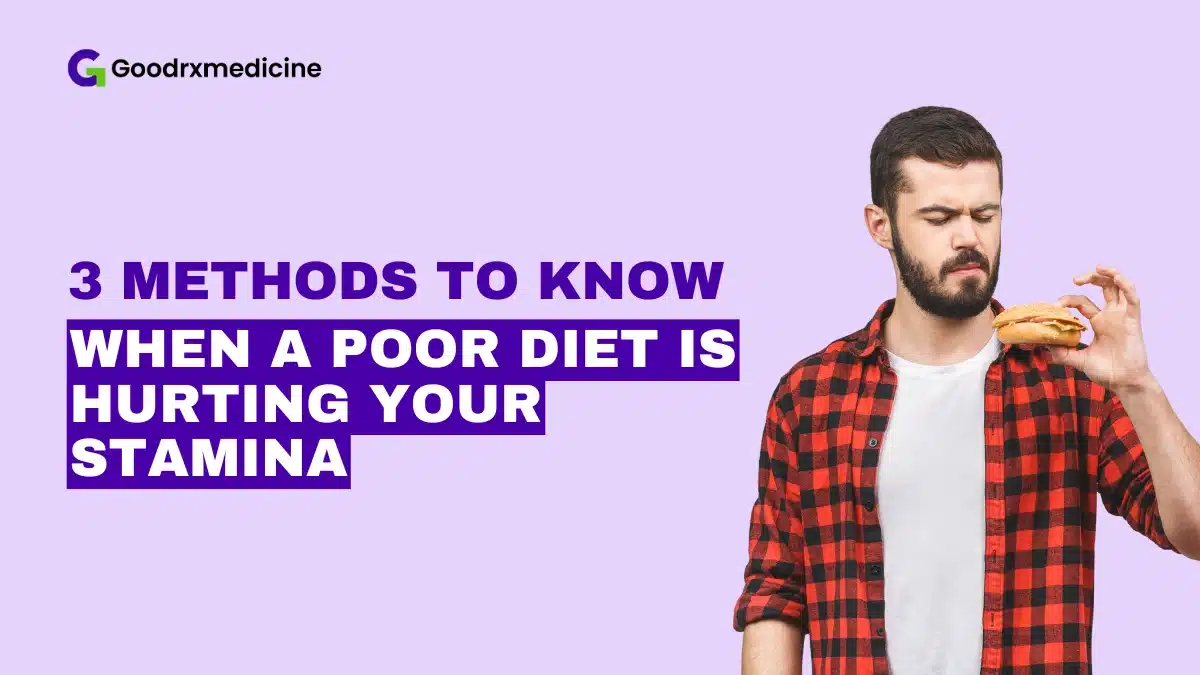Your diet does more than shape your waistline; it fuels your energy, mood, and sexual stamina. If you find yourself feeling sluggish, losing steam too soon, or struggling with motivation, food may be a part of the problem.
Poor diet symptoms like fatigue after meals, energy crashes, and slow recovery can sneak up on you and lower your stamina when you least expect it. But don’t worry, spotting these signs early puts you back in charge.
This guide walks you through three practical ways to spot when your diet drains your stamina, so you can fuel up the right way and perform at your best.
Method 1. Track your energy and performance

The first step to spotting a stamina problem is paying attention to your body. Energy dips and poor recovery don’t happen overnight; they appear in patterns you can track.
Fatigue is often tied to poor nutrition choices, not just stress or lack of sleep. Studies show diets high in refined carbs and low in micronutrients contribute to energy instability. Fatigue related to a poor diet may vary depending on an individual’s activity level and age. For example, sedentary individuals may notice more daytime tiredness, while active people might experience slower muscle recovery.
By observing these signals, you’ll know when food is interfering with performance:
1. Note stamina and fatigue patterns
Your body gives early warnings when fuel is low. Observe these signs:
- Feeling tired even after rest
- Low motivation or loss of interest in sex
- Irritability during intimacy
- Trouble maintaining arousal or an erection
- Quick exhaustion during intimacy
These patterns are common among individuals who experience a poor diet and low stamina.
2. Record post-meal energy changes
Notice how you feel after eating. Red flags include:
- Sudden energy crash or sleepiness
- Feeling bloated or heavy
Once you recognize these patterns, the next step is to look closely at what’s actually on your plate.
Method 2. Review your diet

Many people overlook how meals directly affect drive, energy, and recovery. Research suggests that high-sugar and high-fat meals impair blood flow and endurance.
Diets rich in whole grains, vegetables, and lean proteins provide steady energy, while diets high in junk food and low energy often cause spikes and crashes. This impact also differs based on lifestyle; sedentary individuals usually feel crashes more intensely, while active individuals may experience slower recovery if nutrition is inadequate.
Examine your current eating habits by taking these steps:
1. Identify energy-draining foods
Some foods in particular slow blood flow, trigger energy crashes, and may even cause Low Testosterone, leaving you feeling sluggish when you need stamina most.
Common foods that drag stamina down include:
- Greasy fast foods
- Sugary snacks and sodas
- Packaged, processed meals
- Too much alcohol before sex
These foods do not cause stamina loss in everyone, but they are linked to reduced energy and metabolic strain in many individuals.
2. Note portion sizes and timing
It’s not just what you eat, but when and how much that influences how your body reacts to your meals. Warning signs include:
- Feeling too full before intimacy
- Eating large portions late at night
- Skipping meals, then binging at odd times
Keep a food diary to identify diet mistakes that reduce stamina, which often vary with body weight and age.
Tip: Keep a short food diary for two weeks. Write down the meals you eat and note how your energy and stamina feel afterward. Patterns will stand out quickly.
Now that you’ve reviewed your meals, it’s time to examine how junk food specifically affects performance. High intake of processed foods is associated with metabolic fatigue and reduced physical endurance.
Younger people may recover more quickly from these habits, while older adults often experience a greater impact on their stamina and recovery. Men dealing with a weak erection usually see progress when they improve their eating habits, since better blood flow and energy directly support arousal.
Method 3. Observe physical and emotional signs

Unhealthy eating and fatigue often manifest both physically and mentally, influencing motivation and performance. Poor diet is not the only reason for stamina loss, but it is an essential factor among others.
Junk food doesn’t just leave you feeling tired; it also affects your stamina, recovery, and even your confidence. These signs often appear in both daily life and during intimacy. Diets high in processed and sugary foods contribute to low energy, metabolic issues, and reduced physical performance.
Do the following to understand how your diet is impacting you not only physically, but mentally too:
1. Track fatigue, arousal, and recovery
Poor diet and loss of stamina often go hand in hand. Keep a check on the following signs:
- Arousal fading quickly
- Excessive sweating with little effort
- Struggling to recover after sex
- Feeling drained throughout the day
These signs also reflect foods that decrease stamina, especially when high in refined sugars.
2. Notice mood changes or low motivation
Nutrition doesn’t only affect muscles; it affects the mindset. Warning signs to spot are:
- Mood swings or irritability
- Low motivation to initiate intimacy
- Cravings for junk food and sugar
People who are overweight or underweight may feel these mood and stamina shifts differently because energy metabolism varies with body composition. Ignoring poor diet symptoms can lead to longer-term stamina loss and even Erectile Dysfunction. However, diet is one of several factors that influence stamina, including stress and medical conditions.
What to do when your diet drains your stamina

Recognizing the signs is only half the job. The next step is action. If you are losing an erection during intimate moments, it’s essential to reconsider your lifestyle and diet.
Foods that fuel stamina
Improving stamina with a better diet includes focusing on foods that fuel stamina by increasing endurance, such as:
- Dark chocolate or nuts
- Lean proteins (chicken, fish, eggs)
- Leafy greens (spinach, kale)
- Whole grains (brown rice, oats)
Before intimacy, go light. A small pre-sex snack, like bananas, almonds, or watermelon with water, can keep you steady without weighing you down. These foods support energy but cannot fully resolve stamina issues caused by medical or hormonal conditions.
Simple food swaps to boost stamina and energy
Making simple food swaps can boost your stamina and energy levels. For example, try these changes:
- Replace soda with lemon-infused sparkling water
- Choose grilled over fried foods
- Snack on nuts or roasted chickpeas instead of chips
- Pick fresh fruit with yogurt over packaged desserts
- If you drink, opt for a light spritzer or alcohol-free option
These small changes can improve your nutrition and stamina. These changes counteract the effects of a poor diet and low stamina, and avoid consuming foods that drain your energy. If stamina doesn’t improve after diet changes, the issue may be linked to stress, hormones, or other health conditions. In that case, professional medical guidance is the best next step.
Frequently Asked Questions
How does a poor diet affect different groups differently?
Sedentary individuals and older adults may experience more pronounced fatigue due to poor nutrition, while active and younger individuals may notice quicker impacts on exercise stamina and sexual performance. Adjusting diet accordingly can improve endurance in all groups.
Can a poor diet really cause low stamina?
Yes, a poor diet can lower stamina by reducing the nutrients your body needs for steady energy. Foods high in sugar, unhealthy fats, and low nutrients can cause crashes, slow recovery, and decreased performance in daily activities and intimacy.
Which foods lower stamina and energy levels?
Foods high in sugar, deep-fried snacks, processed meals, and heavy fast food lower stamina by causing energy spikes followed by sudden crashes. These foods slow digestion, reduce blood flow, and make you feel sluggish during physical and intimate activities.
How does junk food affect stamina in the long term?
Eating junk food regularly can lead to low energy, a poor metabolism, and slower recovery over time. It weakens endurance, affects hormonal balance, and reduces overall physical and sexual stamina. Long-term intake also increases fatigue and makes it harder to stay active.
What nutrients are essential for good stamina?
Your body needs iron, vitamin B12, magnesium, and complex carbohydrates for steady stamina. These nutrients support oxygen delivery, muscle function, and energy production. Without them, you may feel tired quickly and struggle to maintain physical or sexual endurance.
Can a poor diet reduce sexual stamina and performance?
Yes, a poor diet can affect sexual stamina by lowering energy, reducing blood flow, and disrupting hormone balance. Diets high in sugar and unhealthy fats make it harder to maintain arousal, recover after sex, or stay energized during intimate moments.
How quickly can diet changes improve stamina?
Many people feel better within one to two weeks of eating healthier foods. Adding whole grains, lean proteins, fruits, and vegetables helps stabilize energy, improve blood flow, and support better stamina. Results vary, but small, consistent changes make noticeable differences.
Does dehydration also affect stamina?
Yes, dehydration lowers stamina by reducing blood flow, causing muscle fatigue, and slowing your body’s ability to cool down. Even mild dehydration can make you feel tired, dizzy, or weak. Drinking enough water helps maintain steady physical and sexual energy.
When referencing outside resources, GoodrxMedicine always provides full citations. To learn more about the measures we use to maintain the quality of our content, please review our Content Information Policy.











